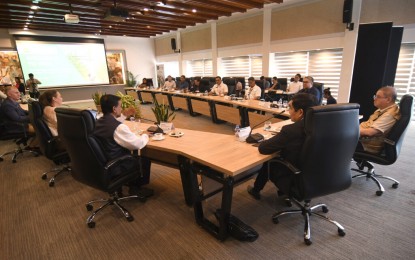
RICE SELF-SUFFICIENCY. Agriculture Secretary Francisco Tiu Laurel Jr. (rightmost) discusses possible partnership expansion with officials of the International Rice Research Institute in Los Baños, Laguna on Wednesday (March 6, 2024). Laurel said implementing convergence of interventions and technologies with the IRRI will help the country achieve rice self-sufficiency targets by 2028. (Photo courtesy of Department of Agriculture)
MANILA – A partnership expansion with the International Rice Research Institute (IRRI) for rice intervention convergence may be feasible by the second half of the year, the Department of Agriculture (DA) said on Friday.
Agriculture Secretary Francisco Tiu Laurel Jr. shared the DA proposal to utilize IRRI's intervention and technologies in select clusters of rice farmlands.
“Together with farmers, DA and its operating units like PhilRice (Philippine Rice Institute), NIA (National Irrigation Administration), the National Rice Program, LGUs (local government units), and IRRI, we will showcase convergence of interventions and services like mechanization and digitalization in these clustered farms," he said in a news release.
"This, basically, will be commercial-scale testing. If you agree with that concept, we will find the legal framework to do it, and fund it,” he added.
The DA chief said such an approach will help the administration achieve its rice self-sufficiency targets by 2028.
“Let us continue to work together on technology scaling, utilization, and deployment, as well as in setting priority research-for-development projects,” Laurel said.
IRRI Board of Trustees Chairperson Cao Duc Phat expressed willingness to actualize such a partnership expansion.
“The Philippines can be the model to the rest of the world to show how to bring these packages of technologies to be useful to the environment, to the farmers, and the people generally. So we are very happy to do that,” he said.
The DA and IRRI earlier agreed to scale up research in rice production in the country, following the signing of a memorandum of understanding (MOU) on Feb. 13.
Under the five-year term MOU, both agencies will continue collaborative activities and implement rice-based research for development.
The IRRI is an independent, non-profit, research and educational institute, which aims to reduce poverty and hunger through science. (PNA)
